
The First and Only Weekly Online Fanzine Devoted to the Life and Works of Edgar Rice Burroughs |
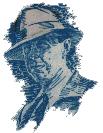 |

The First and Only Weekly Online Fanzine Devoted to the Life and Works of Edgar Rice Burroughs |
 |
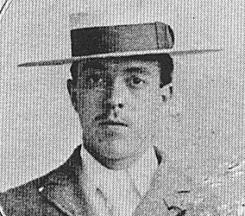
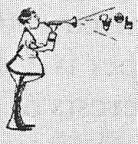 |
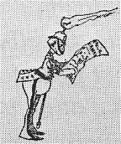
Othello's Fellows |
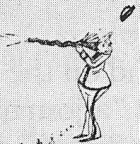 |
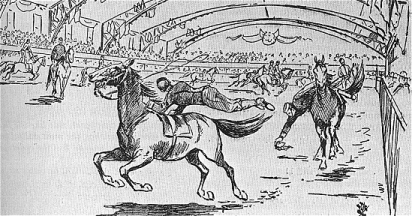
Emma's intense brown eyes searched the tent's cavernous interior relentlessly until they found their goal--an insignificant clutch of nervous young men at the ring's periphery, chain-smoking and trying to keep their horses calm in this unfamiliar, undisciplined place."Oh, look! Look, Papa," she blurted out with apparent spontaneity. "There's a whole raft of seats just opening up in the front row! I'll run ahead and keep 'em safe whiles you 'n' Momma catch up. Take your time, dears."
Seemingly in calm command of the situation, the girl was inwardly a cauldron of competing thoughts and emotions: What's wrong with that boy? Why does he smoke so much? Doesn't he know it ruins the complexion? Not to mention what it does to his breath! And why did he wait til the last minute to let me know his troupe was performing here today? Doesn't he realize these things take time? Of course not--he doesn't even realize such a thing as time exists! And all the work it took to get Momma to get Papa to agree to take us all to the Fair! I swear, I don't know why I do this--he'll never appreciate it--
Just then, her train of thought was derailed by a voice distinctly masculine, but spoiled by a tinge of affectation: "My dear Miss Hulbert!" The words fairly rolled around upon the man's palate before he spoke them, as if reluctant to relinquish them. "What a delightful surprise--whatever brings you to this raucous hub of culture?"
"Why, Mister Canler," Emma rejoined pleasantly, determined not to show her annoyance. "This is the very last place on earth I would've expected to bump into such a gentleman as yourself." She swept the stands around them with a gesture, as if in illustration of her gracious words, but in actuality she was desperately measuring with a glance the distance between her straggling family and herself. "It's family day, don't you know?" she enthused. "Children under twelve get in for free and all that--why here they come right now! Yoo hoo! Leila ... Julia ... over here, dears! Jessie, you run right back up there and catch your Momma's hand before she stumbles. You know how she gets around crowds." Jessie, eager to play the heroine, turned about-face and trotted back up the bleacher steps, while Julia and Leila continued their race to the front row. Emma turned her guileless gaze back towards the patient "gentleman," whose eager smile had not so much disappeared as it had solidified into a knowing grin.
"Quite the acrobat, aren't we?" he riposted with apparent ease, as Emma's two youngest sisters tiptoed their way towards her across the anxious ankles of other, already seated patrons. The gentleman tipped his velvet bowler and bowed slightly. "All the more reason," he softly growled, "to look forward to our next...meeting." And with an almost feline grace, he turned and strode away scant seconds before the two little ones reached their sister's side.
"Emmy's gotta boyyy-fren," sang Leila, the youngest Hulbert, a dauntless twelve-year-old with eyes of steel that dared her adult sibling to return their playful stare.
"Oh, yes," chimed in Julia, a born follower. "Too bad he's twice as old as . . . Papa!" The last word of the taunt, blurted out for effect, mingled with her burst of nervous laughter that trailed off as she looked back at Leila for the next cue. The cue, however, came in the form of physical pressure applied to Julia's right shoulder by Emma's steel grip while Emma's right hand caressed Julia's left cheek and Emma's cheerful visage suddenly appeared, inches away from Julia's own. "You darlings, there you are!" beguiled the senior sister, the very image of solicitude. "Now you two dumplings just stay right here and hold these seats for the rest of us--that's it, you at one end, you at the other, one, two, three, four seats in between--and Leila, dear, you wave that pretty scarf of yours so's Momma sees it . . .." Proud of her ability to manage those little brains, Emma departed in the direction of her parents and her sister Jessie, who were just reaching the bottom steps of the bleachers and still getting their bearings. Directing their attention to a matching pair of pre-pubescent scarf-waving fools in the front row (of course they were competing at it, she half-murmured), Emma gallantly offered to go fetch refreshments and scurried away, relieved, and quite impressed with herself.
Ed was nervous, but excited. This was his big chance. If all went well and the other boys could just keep their ponies calm, the rest was "cake." The house manager had promised him a contract for the Spring and that meant other gigs at other fairs in the states next door -- Michigan, Wisconsin, Indiana, even Ohio -- and this was the same circuit travelled by Buffalo Bill every other year. But he was getting ahead of himself again. "Tom!" he called out hoarsely, then gave out a short, sharp whistle to get his fellow's attention over the circusy din. "The bit--too tight!" Ed telegraphed the information as much by pre-arranged sign language (champing down on his own horse's reins, an agonized but comical expression on his mustachioed face) as by his spoken words, which he knew could be easily lost in the rising and falling roar of the crowd. "Billy, check your stirrups," Ed shouted through cupped hands and pointed to the offending piece of equipment depending a full half-foot lower than its iron mate. "Okay, mount up -- it's showtime!" As the three caballeros reined-in their skittish steeds, their eyes were rivetted upon the red-coated Ringmaster as he strode cockily into the center ring in the full glare of a spotlight (powered, Ed knew, by the American Battery Company--why in blazes weren't they advertising it?). "Ladies aaaaaaaand gentlemen!" the man droned through a hand-held megaphone, "You've heard of Pecos Bill...you've read about the equestrian antics of Billy the Kid...you've even seen posters of the famed Lippizan Stallions...but you've never witnessed horsemanship until you've watched, with your own eyes, the death-defying, scene-stealing, nerve-wracking performance of"--he stretched out an open palm towards the ring's periphery and the spotlight shifted jerkily in that direction--"the Michigan Musketeers!" The sound of isolated clapping burst out in the darkness, starting from the now invisible ringmaster, picked up by the shills scattered throughout the stands, and within seconds the whole house echoed to unrestrained applause while the shifting spotlight finally found its mark, and three sparsely adorned palaminos reared up in unison and pawed the air three times, then resumed a four-pont stance and shook their heads three times in unison, their flowing manes sparkling in the glare. The three smartly uniformed riders raised their riding crops above their heads but once, flicked them down and back, and three bolts of gold and blue shot into the center ring in tandem. Ed, from the corner of his eye, caught a momentary glimpse of a familiar feminine form and face that had barely missed colliding with Billy's mount, stepping back out of its path scant seconds before the three "Michigan Musketeers" were discharged into the arena. Emma! screamed through Ed's cerebral cortex with near disastrous results, until, just below the threshold of normal hearing, a tearing sound registered upon his ears. One of his saddle-cinches was separating! His mind began to race, his scattered senses focussing on all the information issuing from the frightened beast beneath him.
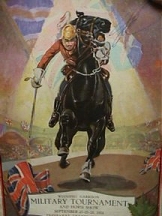
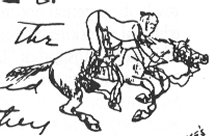 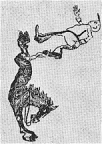 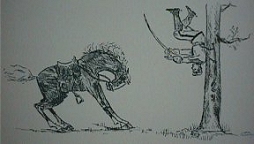 |
The setting sun painted the reading room an eerie chiaroscuro, the burnished mahogany of the table tops alternating checkerboardlike with the blood-black shadowed spaces in between. Like sunken ships, the ornate backs of chairs rose up out of the shadows with a most civilized regularity. Then it was that Will admitted defeat: his mind was saturated -- nay. . .surfeitted; he would read no more this day, and slammed the dusty tome before him shut as if to dramatize the fact. Not that there was anyone left to disturb in this wing of the library at this hour of the day. (At this hour of the year, he would have said if he still had his wits about him.) The holiday had crept up on him almost unawares, so heavily engrossed had he become in his professorial duties in this the first semester of the first year of his illustrious teaching career. He almost envied the other faculty members, who, like their homespun students, had hearth and home nearby to which they would soon repair to feast and frolic. Almost . . . because, unlike the hoi polloi, he, William Edward Burghardt DuBois, the newest -- and youngest -- instructor in Greek and Latin at Wilberforce University, had a book to write.
II. November 1894, Wilberforce University, Xenia, Ohio
The battered old leather briefcase into which he shoveled the day's stack of notes constituted virtually the only keepsake he still possessed of his student days at Harvard, where he had been the only Negro in the graduating class of 1890--in fact, the first Negro to even be admitted to that renowned liberal institution. The cowhide bag had been a going-away gift from his family, each member thereof having made their own unique contribution to its manufacture--his Uncle James had procured and tanned the hide from the meat-packing plant where he was sporadically employed; the meticulous cutting and stitching according to a design extrapolated from an illustration in the Sears-Roebuck Catalog was his mother's labor of love; the elaborate heraldic chasing on the front flap was his "halfwit" older brother Adelbert's magnum opus; and the bag's various brass fittings and buckles had been gathered by his cousin Inez on her routine visits to Salvation Army missions all across their native State of Massachusetts. His colleagues at the University of Berlin -- just last year! -- had stubbornly refused to believe that so fine a work of craftsmanship could possibly have been the product of lowly American Schwarzenvolken. That Will himself was also a product of that mysterious, mythical subspecies of humanity was even more of a mystery to them. And yet, despite their incomprehension -- or perhaps because of it -- they had seen fit upon his departure from Berlin to award him with the stout, ornately carved walking stick that still accompanied him on all his outings. He sported it with a sense of pride at its African origin, tempered by the humiliating knowledge of exactly how it had come into the possession of his European associates. The cane thus served as both a token of his friendship with whites and a talisman against it. Wrapping his tartan scarf an extra turn about his neck, Will strode eagerly down the library's Neoclassical marble stoop, impelled as much by hunger as by the prospect of the blazing fireplace he knew awaited him at his quarters (or, at least, in the parlor and the kitchen of the boarding house wherein he resided--Mrs. MacLean never let the hearth go out, no matter what it cost her lodgers in kind: Will was becoming quite adept at rail-splitting, a "regular Abe Lincoln," as she liked to put it). His usual route across the campus was quite circuitous, as it was his wont to unwind after a day's work by strolling at a brisk pace along the mile-and-a-half perimeter of the commons, which also afforded him an opportunity to hobnob with a fair cross-section of the college's population -- Hoi Polloi University, he jokingly referred to it in his private thoughts. Today, however, with virtually no one left on campus in anticipation of the holiday ("Thanks Gibbons" was his private term for it; the Darwinian humor of which was lost on virtually all his fellows in this bastion of Evangelical Christianity), he made a beeline for the boardinghouse, which stood at the western outskirts, adjacent to the rear gate of the campus.
The sun had set and dusk was deepening. The only building between him and his destination was an old, abandoned silo which had somehow survived the collapse of the barn to which it had formerly been attached. Will had no idea why the college kept it standing, except that the cost of dismantling it probably exceeded the cost of insuring it. In fact, he was quite surprised to see evidence of a light within, breaking through around the edges of a tightly-fitting, ground-level door made of the same corrugated metal as the rest of the otherwise apertureless cylinder.
Will had often intended to visit this American Gothic landmark, as he understood it housed a most curious and eccentric individual--a freshman undergraduate student named Gridley. Older than his peers by a good five years, Gridley had displayed an uncanny grasp of the physical sciences, which had won him not only admission to the college in the absence of any documentation of previous schooling, but a full scholarship as well. In lieu of regular dormitory accomodations, young Master Gridley had requested -- and obtained -- the run of this derelict structure as his personal living quarters, and it was here that he (reportedly) spent all his extracurricular hours. He was rarely seen on campus except for attendance at class, and he was not known to entertain any guests. Conversely, none of the curious among the student body had been successful at gaining egress into the structure since Gridley had taken it over, nor at eliciting any response from within. Nor, so far as Will was aware, had any of them ever ventured near the place at night. Ye gods, but they were a superstitious lot! He would certainly have his hands full elevating even these -- the best and the brightest of his race -- above the sorry state to which the current, "trans-Atlantic" phase of history had relegated them.
Perhaps it was some pedagogic purpose, then, and not mere idle curiosity -- nor, fates forfend, some long-suppressed sense of adventure -- that drove the young professor to approach this terra incognita. As he neared the structure, however, the glimmer of a lantern in the distance, several hundred feet beyond the silo, froze him in his tracks. Assuming it was young Gridley returning home, he nonetheless took the precaution of ensconcing himself behind a stout tree until he could verify the person's identity. Although he had never met Gridley personally, the lad had been pointed out to him on more than one occasion. His tall, lanky frame was unmistakeable, as was the short-waisted, fleece-lined leather coat he always wore. When the lantern's glowing radius finally engulfed the base of the silo, therefore, Will was strangely relieved to recognize both the jacket and its wearer, for he would have been hard pressed to explain his presence there otherwise. On the other hand, he had not the slightest idea what he would say or do once he made his presence known to Gridley, nor even how -- or whether -- he would announce himself. Feeling positively foolish, the young academician resolved to steal away and go about his own business once the unsuspecting student had retired within his domicile.
After a few minutes' fiddling with the padlock on the silo's door, Gridley flung wide the massive corrugated panel, thereby flooding a broad slice of the surrounding field with light -- a much brighter light than Will thought possible by means of a conventional Edison electric lamp. But the strange, strong effulgence also revealed to Will a fact of which young Master Gridley, standing in the open doorway in the full glare of the light, could not possibly be aware: crouching behind the boles of a dozen trees ringing the ancient grain sanctuary were an equal number of well-built men, all garbed in white, hooded robes and armed to the teeth with a variety of firearms, stout clubs, and ample lengths of rope.

The bitch's ears pricked up at the approach of the horsemen just before they appeared on the horizon. The old man's senses, dulled somewhat from long confinement, were but slightly slower than hers: when the riders halted on the crest of the ridge to survey their destination, it was the sudden silence that awakened him. There were two of them, mounted on big, powerful beasts, but laden down with steel and lead and leather. The old man's mount was thin and wiry and well rested. It would be an interesting chase: the outcome was no longer clear, even to him. The dog, fully alarmed now, was on the point of barking out her customary warning when the old man's whispered, firm command quelled her quavering vocal chords, but none of her alertness. The low growl that issued through her clenched teeth was masked by the steady wind blowing down from the ridge, so the strangers were doubly unaware of her presence when she faded from the darkened porch to seek her master's side within the house.
III. November 1894, Apache Reservation, Fort Sill, Oklahoma
The old man's wife opened one eye to see what had disturbed their slumber this time. She knew, more from the dog's behavior than her husband's, that some new and unknown danger lurked without the walls of this new place. In the moonlight pouring through the ample gaps in the roofing surface, she could see him moving in an arc towards the rear of the house, gathering his few belongings as he went. She caught his active eyes with a well-known gesture that asked the well-worn question, Que pasa? The old man paused in his flight just long enough to return the woman's gesture with a rapid series of his own that said: Two men are coming. Be still. It's me they're after. I will draw them off. When I have done so, leave this place and wait three days at the spot I showed you from the train. Then, with a final gesture that betokened their mutual affection, he was gone, and with him his silent, shadowy companion.
The woman lay still, barely breathing, intently listening, and though the shed that sheltered their single "beast of burden" was adjacent to the rear wall of the house, she heard no sound from that direction. Yet loud and clear across the level plain spread out before the ramshackle building, the bold beat of heavy hoofs striking the earth was carried to her ears. The pounding changed momentarily to sharp stacatto splashing as the horses entered the shallow stream that paralleled the distant ridge, then abruptly resumed. Not until the mounting din crescendoed in a pair of jarring thuds accompanied by skittering pebbles, clanking hardware, and creaking leather did she draw a deep breath and hold it. She heard two rifle latches click and was relieved when they proved to be but heralds to a volley of spoken words: "Apache! You come out now, eh? You come wit' us sure, one way or de odder." She could not place the accent, and now the speaker was pausing for some reply or sign of movement from within the cabin.
Then, like the blast of a train whistle, the deadly stillness was shattered by a shrill, piercing shreik, half human and half bird of prey, or so it seemed to the strangers as they tried to whirl about in their saddles while hanging onto reins and pommels as their startled horses reared in fright. But fleeting glimpses of the source of the alarm were all that they could gain: the shreik seemed to have taken bodily form and now was darting in and out of a three-yard radius whose center was defined by their horses' hind legs, which seemed immovably fixed to the earth as the frantic beasts continued to rear up and paw the air. At the same time, the shreik was also continuing to issue in an ululating stream from a moving blur of black and white that sped around and around at the circumference of that same invisible, inflexible radius. And worst of all, unseen, but felt with excruciating pain, were a series of merciless hammer blows to both riders' heads from all directions. Their disorientation and confusion were complete. Then, as suddenly as the attack had begun, it ceased, leaving the riders reacting still, blinded and angry, even as their horses settled down to pacing to and fro.
Then, after no more than a minute's time, the same ungodly shreik arose again, this time from afar off, back in the direction of the stream they had so recently crossed. Their horses did not rear this time, although they started, agitated and afraid, backing away instinctively from the weird phenomenon, which now the men made out distinctly--a diminutive horseman, brandishing a stout wooden staff and mounted on a wiry Appaloosa, rampant in midstream, a frozen apparition of contempt. Beside them in the water stood a dog of indeterminate breed, mottled black and white and tan. In a spark of realization, the one who had spoken earlier now broke the demon's spell: "Is him -- dat damned Apache!" The words were barely out before the man was spurring his poor mount in the direction of the stream, shouting over his shoulder to his hapless, still bewildered fellow a curt command. The old man had sped away towards the ridge the instant he had gained the stranger's attention, so that by the time his pursuers reached the stream he was already at the crest of the ridge, whence he paused to let out one more mocking war-whoop, then disappeared over the horizon, followed by his faithful furry familiar. At the doorway of the ramshackle building on the far side of the stream, an old woman stood watching the grim proceedings. After the strangers were gone from sight, she quietly and efficiently set about gathering up her household.





JACK OF TIME ~ An ERB Time-Shift Novel ~ by Frank X. Blisard
ERBzine 0280 JACK OF TIME: ERB Novel Intro & Ch. 1 - "After the Fire..." |
e-Mail: frankblisard@msn.com
![]()
![]()
![]()
Issue
0663

BILL
HILLMAN
Visit
our thousands of other sites at:
BILL
AND SUE-ON HILLMAN ECLECTIC STUDIO
ERB
Text, ERB Images and Tarzan® are ©Edgar Rice Burroughs, Inc.-
All Rights Reserved.
All
Original Work ©1996-2002/2010 by Bill Hillman and/or Contributing
Authors/Owners
No
part of this web site may be reproduced without permission from the respective
owners.